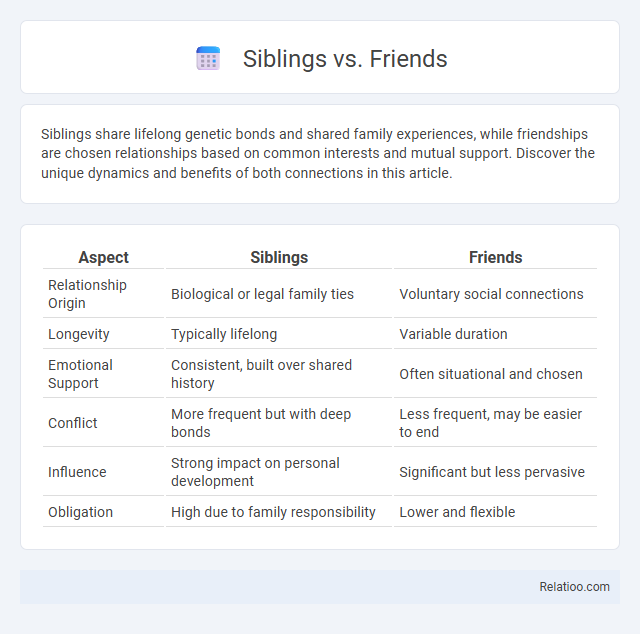Siblings share lifelong genetic bonds and shared family experiences, while friendships are chosen relationships based on common interests and mutual support. Discover the unique dynamics and benefits of both connections in this article.
Table of Comparison
| Aspect | Siblings | Friends |
|---|---|---|
| Relationship Origin | Biological or legal family ties | Voluntary social connections |
| Longevity | Typically lifelong | Variable duration |
| Emotional Support | Consistent, built over shared history | Often situational and chosen |
| Conflict | More frequent but with deep bonds | Less frequent, may be easier to end |
| Influence | Strong impact on personal development | Significant but less pervasive |
| Obligation | High due to family responsibility | Lower and flexible |
Defining Siblings and Friends: Key Differences
Siblings share a biological or familial bond that often includes shared upbringing, genetics, and lifelong connection, while friends are chosen companions based on mutual interests, trust, and emotional compatibility. Your emotional support system may differ as siblings provide deep-rooted understanding and long-term loyalty, whereas friends offer voluntary, flexible support tailored to your current needs and experiences. Understanding these distinctions helps you navigate the unique roles both relationships play in your emotional well-being.
Emotional Bonds: Blood vs Choice
Emotional bonds between siblings are often rooted in shared genetics and family history, creating a foundation of unconditional support and familiarity. Friendships, by contrast, are built on choice, trust, and shared experiences, allowing individuals to cultivate emotional connections based on mutual interests and values. While sibling relationships provide a lifelong sense of belonging, friendships offer flexibility and emotional intimacy that can sometimes surpass familial ties in depth and understanding.
Lifelong Connections: Stability and Change
Siblings often provide lifelong emotional support due to shared history and family bonds, offering stability during life's changes. Friends can become chosen family, adapting to your evolving needs and circumstances, creating dynamic emotional connections. Your social network, blending siblings and friends, shapes resilience by balancing consistency with growth over time.
Conflict Resolution: Family Dynamics vs Friendships
Conflict resolution within family dynamics, especially between siblings, often involves navigating deep-rooted emotional bonds and shared histories, which can make disputes more intense but also more meaningful to resolve. Friendships typically allow for more flexibility and individual boundaries in managing conflicts, as they are chosen relationships that often prioritize mutual respect and communication. Your approach to resolving conflicts should consider these differences, focusing on empathy and active listening to foster emotional support in both family and friendship contexts.
Support Systems: Who’s There When It Counts?
Siblings often provide a lifelong emotional support system rooted in shared history and unconditional loyalty, while friends offer chosen connections that can be more flexible and diverse in addressing your evolving needs. Emotional support from siblings tends to be consistent during family challenges, whereas friends might step in more during personal growth or life transitions. Your strongest support system may combine both siblings and friends, ensuring you have reliable presence when it truly counts.
Social Development: Lessons from Siblings and Friends
Siblings provide a unique foundation for social development by fostering conflict resolution skills, empathy, and long-term emotional support that shape your interpersonal abilities from an early age. Friends complement this growth by offering diverse perspectives and social experiences that enhance communication and adaptability in various social settings. Together, relationships with siblings and friends create a balanced network of emotional support essential for your overall social maturity.
Competition and Rivalry: Sibling vs Peer Comparison
Sibling relationships often involve inherent competition and rivalry rooted in family dynamics, which can influence emotional support differently than friendships, where competition is typically less intense and more situational. Peer comparisons among siblings frequently trigger lifelong rivalries impacting self-esteem and emotional well-being, while friendships encourage support through shared goals and mutual understanding. Emotional support from siblings may be complicated by ongoing rivalry, whereas friends tend to provide a more balanced space free from constant comparison.
Trust and Loyalty: Tested Through Time
Siblings often share a deep-rooted trust and loyalty forged through years of shared experiences and family bonds, providing a unique emotional support system. Friends offer chosen companionship, where trust is built over time through mutual understanding and shared interests, often reflecting loyalty that withstands various challenges. Your emotional support network thrives on this balance between the innate reliability of siblings and the cultivated trust found in friendships, both tested and proven through time.
Influence on Personality: Nature vs Nurture
Siblings and friends play distinct but complementary roles in shaping personality through the interplay of nature and nurture, where genetics provide the biological foundation while social interactions cultivate emotional traits. Siblings often influence personality development by modeling behaviors and fostering familial bonds that reinforce genetic predispositions, contributing to emotional resilience and social skills. Friends expose individuals to diverse perspectives and experiences beyond familial environments, promoting adaptability and emotional support that mold personality in ways distinct from sibling dynamics.
Navigating Loss and Distance: Maintaining Relationships
Navigating loss and distance requires intentional effort to maintain relationships with siblings and friends, as both serve vital roles in your emotional support network. Emotional bonds with siblings often carry a lifelong familiarity that can provide stability during grief, while friendships offer chosen connections that can adapt over time. Prioritizing regular communication and sharing feelings openly helps bridge the gap caused by physical separation and emotional pain.

Infographic: Siblings vs Friends
 relatioo.com
relatioo.com